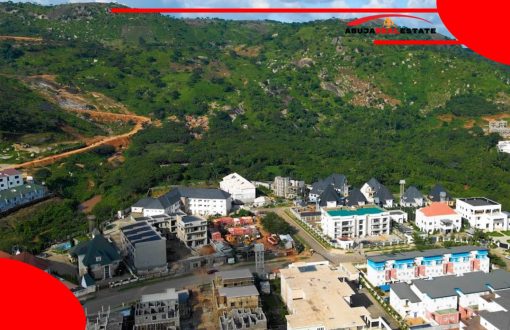How to Invest in Nigeria Real Estate as a Foreigner

Investing in real estate is one of the most secure and profitable ways to grow wealth globally. For foreigners, Nigeria presents a unique and promising market that has seen significant growth over the past few years. With a thriving population, a developing economy, and a rapidly expanding urbanization rate, Nigeria offers a range of investment opportunities for real estate investors looking to capitalize on its burgeoning market.
However, navigating the Nigerian real estate market as a foreigner requires understanding legal frameworks, market trends, and available investment options. In this guide, we’ll walk you through the essential steps to invest in Nigeria’s real estate market effectively and safely.
Understanding the Nigerian Real Estate Market
The Growth Potential
Nigeria’s real estate sector has experienced significant growth due to the country’s expanding population and increasing urbanization. The government is also making strides to improve infrastructure, creating more opportunities for real estate investments. Cities like Lagos, Abuja, and Port Harcourt have seen remarkable growth in both residential and commercial properties.
The demand for housing, particularly in the urban areas, continues to grow, driven by Nigeria’s youthful population and increasing middle-class demographic. Foreign investors are drawn to Nigeria’s potential, as it offers an attractive rate of return compared to more mature markets.
Legal Framework for Foreign Real Estate Investors
Can Foreigners Own Property in Nigeria?
Yes, foreigners can own property in Nigeria. However, there are certain legal guidelines that must be followed. According to Nigerian law, non-Nigerians can buy land in the country, but there are restrictions on land ownership, especially when it comes to rural land or land situated near national borders.
Foreigners can acquire property in Nigeria by leasing land for a maximum of 99 years under the Nigerian Land Use Act. They can also own property in urban areas by purchasing through a company or partnership with Nigerian citizens.
Types of Real Estate Investments in Nigeria
Residential Properties
Investing in residential properties is one of the most popular options for foreigners. This includes purchasing single-family homes, multi-family units, apartments, and condominiums. The rising demand for affordable housing in urban areas provides excellent opportunities for rental yields, especially in cities like Lagos and Abuja.
Commercial Real Estate
Commercial properties, such as office buildings, retail spaces, and warehouses, offer high rental returns due to the increasing demand for commercial spaces. Nigeria’s growing economy and urbanization have created a need for business hubs, office complexes, and industrial spaces, making commercial real estate a valuable investment opportunity.
Land Investments
For those willing to take a long-term approach, land investments in developing areas are an attractive option. Acquiring land in up-and-coming areas can yield substantial returns when the infrastructure catches up. The value of land in areas near major roads, transportation hubs, or growing urban centers is likely to appreciate over time.
Step-by-Step Guide to Investing in Nigerian Real Estate
Step 1: Do Thorough Market Research
Before making any investment, it’s crucial to understand the local market dynamics. This means conducting in-depth research into the different regions and sectors of the real estate market. Some key points to research include:
- Location: Focus on urban areas with high demand for housing and commercial properties.
- Property Value Trends: Understand price fluctuations and the growth potential of properties.
- Rental Yields: Research the rental return on investment (ROI) to understand the potential income from property investments.
Engage with local real estate experts and consultants to get up-to-date information. Online resources like real estate blogs, forums, and property websites can also offer valuable insights into current trends.
Step 2: Choose the Right Investment Type
Based on your research, choose the type of investment that best fits your goals. Whether it’s residential, commercial, or land investments, make sure it aligns with your risk tolerance, expected returns, and investment horizon. Residential properties in cities like Lagos often offer quicker returns, while land investments may take more time but offer larger long-term gains.
Step 3: Understand Legal Requirements and Ownership
As a foreigner, it’s essential to understand the legal processes involved in acquiring property in Nigeria. To legally own property in Nigeria, ensure you:
- Register with Nigerian Authorities: You’ll need to get clearance from the relevant government bodies, such as the local government authority and the Federal Ministry of Lands.
- Title Verification: Ensure that the property has a clear title to avoid disputes later. A valid Certificate of Occupancy (C of O) is a must-have.
- Hire a Local Lawyer: Always consult a local lawyer who understands Nigerian property law and can guide you through the entire process.
Step 4: Secure Financing
While many foreigners choose to purchase property in cash, there are financing options available for foreign investors. You can approach Nigerian banks that offer financing for foreign nationals, but be prepared for higher interest rates compared to local investors. Some banks require you to have a Nigerian bank account to process transactions.
It’s also possible to partner with local investors who can provide financing or act as co-owners of the property.
Best Cities for Foreign Real Estate Investment in Nigeria
Lagos
As the largest city and economic hub of Nigeria, Lagos remains a top choice for foreign real estate investors. The city’s demand for residential and commercial properties continues to grow, with districts like Lekki, Victoria Island, and Ikeja being particularly attractive for investment.
Abuja
Abuja, Nigeria’s capital, offers a stable and highly regulated environment for property investments. The city’s growing government infrastructure and demand for residential properties, particularly in well-planned areas like Jabi, Asokoro, and Wuse, make it an excellent place for foreign investors.
Port Harcourt
Port Harcourt is the heart of Nigeria’s oil industry and has seen significant growth in the real estate sector. The demand for housing and office space remains high due to the influx of professionals working in the oil and gas sector.
Other Notable Cities
- Ibadan: Known for its more affordable property prices, Ibadan offers potential for growth as a growing urban center.
- Calabar: This city is another emerging real estate market with investment opportunities, especially in hospitality and tourism.
Key Considerations for Foreign Investors
Currency Exchange Rates
One of the challenges for foreign investors is navigating the Nigerian naira’s exchange rate volatility. Currency fluctuations can significantly impact the value of your investment, so it’s crucial to keep an eye on the exchange rate and consult with financial advisors who understand local currency trends.
Political and Economic Stability
While Nigeria has vast potential, it’s important to consider the political and economic landscape. Although the country has a growing economy, it is also subject to periods of political instability and inflation. Always assess the political environment before making long-term commitments.
Corruption and Bureaucracy
Nigeria’s real estate sector has faced issues with corruption and bureaucracy. To mitigate this, ensure you work with trusted legal experts and reputable real estate agents. They will help you navigate the system and avoid potential scams or legal pitfalls.
The Risks of Investing in Nigerian Real Estate
Legal Risks
As with any international investment, understanding the legal risks is essential. Foreign investors must deal with complex laws and regulations that could vary by region. It’s essential to work with a lawyer familiar with the property laws in Nigeria to avoid legal complications.
Market Risk
The Nigerian real estate market can experience periods of volatility. Changes in government policies, global economic shifts, or oil price fluctuations can influence the market. Therefore, it’s important to monitor the economic conditions and understand market trends before committing large sums of money.
Conclusion
Investing in Nigerian real estate as a foreigner can be a lucrative venture, but it requires thorough research, careful planning, and legal diligence. By understanding the market, selecting the right type of investment, and navigating the legal landscape, you can position yourself for long-term success in Nigeria’s booming real estate sector.
If you want to dive deeper into specific topics, check out resources like Abuja Real Estate for valuable insights and guidance on your investment journey.


